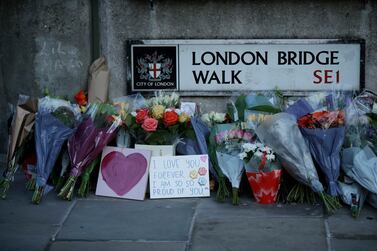The UK has unveiled new counterterrorism measures, including lie-detector tests, to stop extremists "gaming" the release system and perpetrating more crimes.
It comes after the recent London Bridge terror attack by convicted terrorist Usman Khan, which killed two people.
Khan had been jailed for plotting to blow up the London Stock Exchange but after his early release from prison he deceived the authorities into believing he had been rehabilitated.
After the attack, Prime Minister Boris Johnson had pledged to make changes and launched a major review into how convicted terrorists are managed.
Khan had been sentenced to a minimum of eight years in prison in 2012 with a requirement that the parole board assess his danger to the public before release.
But he was released in December 2018 without such an assessment.
Now, the new measures will see tougher jail sentences introduced and the end of early release, the government said on Tuesday.
"The senseless terror attack at Fishmongers' Hall in November confronted us with some hard truths about how we deal with terrorist offenders," Home Secretary Priti Patel said.
"Today, we are... giving police and probation officers the resources they need to investigate and track offenders, introducing tougher sentences, and launching major reviews into how offenders are managed after they are released."
Today, we’re announcing a counter-terror package including tougher sentences for offenders, an overhaul of probation, and a £90m increase in funding for CT Police. We are also investing in support for victims of terrorism. pic.twitter.com/kkdR9OePpx
— Home Office (@ukhomeoffice) January 21, 2020
The government, elected in December, said it would introduce new counterterrorism legislation within its first 100 days that would force dangerous offenders who receive extended determinate sentences to serve the whole time in jail.
Those convicted of offences such as preparing acts of terrorism or directing a terrorist organisation would face a minimum of 14 years in prison, the government said. It said it would also review how terrorism offenders are managed when they are released.
The father of one of Khan's victims, Jack Merritt, 25, who had worked on a prisoner rehabilitation project, said at the time his son would have been upset to see his death used to justify tougher penalties.
The Home Office said a bill would be brought before Parliament in March.
There are 225 terrorists serving sentences in UK jails and more than 70 convicted terrorists have been released on licence.
The government has already launched an urgent review into the licence conditions of the 74 terrorism offenders who had been released early from prison.
On Tuesday, it said Jonathan Hall QC, the government's independent reviewer of terrorism legislation, will oversee "a sweeping independent review" of the multi-agency system dealing with terrorism offenders.
The proposed bill will double the number of probation officers specialising in terrorism prisoners and introduce measures such as polygraph testing.
Presently, lie-detector tests are only used with sex offenders.
It will increase the number of places available in probation hostels so officials can keep closer tabs on terrorists in the weeks after their release from prison.
The government said it would also review the support available to victims of terrorism, pledging to invest £500,000 (Dh2.4m) "to ensure more victims get the support and advice they need, faster".
It will simultaneously increase the counterterrorism police budget by £90m to £906m in the coming financial year.
Justice Secretary Robert Buckland says more still needs to be done to monitor terrorism offenders behind bars and once they are freed.
"We have to be ready to challenge our own assumptions at all times, and to ask ourselves the question — are we really on top of this? How do we track it? Is it just going to be Islamic terrorism?" he said.
"The far right are a factor as well. We deal with many facets of extremism in our prisons."
He warned after the attack that some prisoners are “not capable of rehabilitation” and extremists can “hoodwink” even the most experienced professionals.
Earlier this month, former government adviser Ian Acheson, who carried out a review of extremism in prisons for the government, revealed the UK's main prison-based deradicalisation programme was seen as open to manipulation by convicted terrorists who wanted to avoid official scrutiny on their release.
Mr Acheson said his 2016 study revealed that the psychological programme was “easy to game” but his concerns were not included in a summary version of the report released to the public.
Mr Acheson's comments came after the man behind the convict-focused Health Identity Intervention programme told the BBC there was no guarantee of its success and said that some terrorists regressed while going through the programme.
Khan had been on the programme.
Questions over HII followed comments by a former mentor of Khan who claimed that authorities ignored his warnings the terrorist might have faked his renunciation of violence.
Khan, 27, was on electronic tag when he carried out the knife rampage at London Bridge, killing Saskia Jones, 23, and Mr Merritt and injuring three others.
The incident happened at a prisoner rehabilitation event where the pair were working.
He was shot dead by police after brave members of the public apprehended him.







